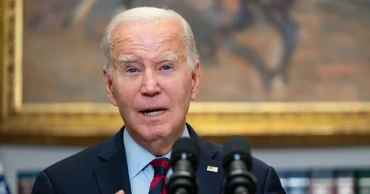Genocide
UN court begins hearings on ‘genocide’ of Rohingya by Myanmar
The United Nations’ top court on Monday began hearings on whether Myanmar committed genocide against the Rohingya ethnic minority, a case first brought by Gambia in 2019.
Gambia filed the case at the International Court of Justice (ICJ), accusing Myanmar’s military of violating the 1948 Genocide Convention during its so-called “clearance operations” in Rakhine state in 2017. Myanmar has consistently denied the allegations.
Lawyer Paul S. Reichler, representing Gambia at a preliminary hearing in 2022, warned that without ICJ oversight, Myanmar’s military “will be accountable to no one” and could continue persecuting the Rohingya.
Read more: Concerned about Rohingya children growing up as angry young people: Prof Yunus
The 2017 military campaign followed an attack by a Rohingya insurgent group. Security forces were accused of mass killings, sexual violence, and burning thousands of homes, forcing more than 700,000 Rohingya to flee to Bangladesh. Today, around 1.2 million Rohingya remain in overcrowded camps, where children face recruitment by armed groups and girls as young as 12 are subjected to sexual exploitation. Severe cuts in international aid last year further worsened the humanitarian situation.
Rohingya activist Lucky Karim of Refugee Women for Peace and Justice said the ICJ hearings offer “a beacon of hope” that justice for the persecuted minority will not go unheard.
Myanmar was initially represented at the court by Nobel laureate Aung San Suu Kyi, who denied genocide allegations and attributed the Rohingya exodus to clashes with insurgents. She is now imprisoned following the military takeover and convictions widely seen as politically motivated.
Myanmar challenged the ICJ’s jurisdiction, arguing that Gambia was not directly involved in the conflict. In 2022, the court rejected the claim, allowing the case to proceed. Experts say the outcome could set a precedent for other genocide cases, including a South African case against Israel.
Juliette McIntyre, an international law specialist at the University of South Australia, said while the legal standard for genocide is strict, the ICJ might broaden its interpretation, validating victims’ experiences and supporting further legal action.
Read more: Dhaka, Washington discuss upcoming elections, economic, Rohingya issues
A ruling of genocide could also strengthen proceedings at the International Criminal Court, which in 2024 requested an arrest warrant for Myanmar’s military chief, Senior Gen. Min Aung Hlaing, over crimes against the Rohingya—a request that remains pending.
1 month ago
Former ministers Amu, Qamrul produced before ICT
Former ministers Amir Hossain Amu and advocate Qamrul Islam have been produced before the International Crimes Tribunal (ICT) in connection with a genocide case.
They were presented before the court around 10 am, according to the prosecution.
On December 2, the ICT directed the relevant authorities to produce them on Wednesday.
It has been reported that the duo will be shown arrested in a case filed on charges of crimes against humanity and genocide allegedly committed during the July-August mass uprising.
Read: Protest Rally demands compensation, rehabilitation for victims of July-August uprising
Qamrul was detained by detectives from the Dhaka Metropolitan Police in Uttara, Dhaka, on November 18. He was subsequently shown arrested in a case related to the death of businessman Abdul Wadud, 45, which occurred on July 19 in the New Market area during the anti-discrimination student movement.
Separately, Amu was apprehended by detectives from a residence in West Dhanmondi on November 6. He has also been implicated in the same case.
1 year ago
'Will no longer be complicit in genocide': US Air Force personnel sets himself on fire outside Israeli Embassy in Washington
An active-duty member of the U.S. Air Force was critically injured Sunday after setting himself ablaze outside the Israeli Embassy in Washington, D.C., while declaring that he “will no longer be complicit in genocide,” a person familiar with the matter told The Associated Press.
The man, whose name wasn’t immediately released, walked up to the embassy shortly before 1 p.m. and began livestreaming on the video streaming platform Twitch, the person said. Law enforcement officials believe the man started a livestream, set his phone down and then doused himself in accelerant and ignited the flames. At one point, he said he “will no longer be complicit in genocide,” the person said. The video was later removed from the platform, but law enforcement officials have obtained and reviewed a copy.
The person was not authorized to publicly discuss details of the ongoing investigation and spoke to the AP on condition of anonymity.
Police did not immediately provide any additional details about the incident.
Read: Israel vows to target Lebanon's Hezbollah even if cease-fire reached with Hamas in Gaza
The incident happened as Israeli Prime Minister Benjamin Netanyahu is seeking the cabinet approval for a military operation in the southern Gazan city of Rafah while a temporary cease-fire deal is being negotiated. Israel’s military offensive in Gaza, however, has drawn criticisms, including genocide claims against the Palestinians.
Israel has adamantly denied the genocide allegations and says it is carrying out operations in accordance with international law in the Israel-Hamas war.
In December, a person self-immolated outside the Israeli consulate in Atlanta and used gasoline as an accelerant, according to Atlanta’s fire authorities. A Palestinian flag was found at the scene, and the act was believed to be one of “extreme political protest.”
Read: Israeli officials to meet on a proposed pause in Gaza while the Cabinet is set to OK a Rafah plan
In a statement, the Metropolitan Police Department in Washington said its officers had responded to the scene outside the Israeli Embassy to assist U.S. Secret Service officers and that its bomb squad had also been called to examine a suspicious vehicle. Police said no hazardous materials were found in the vehicle.
Also read: Netanyahu seeks open-ended control over security and civilian affairs in Gaza in new postwar plan
2 years ago
UN court keeps genocide case against Israel alive as Gaza death toll surpasses 26,000
The death toll from the Israel-Hamas war in the Gaza Strip surpassed 26,000 on Friday as the International Court of Justice was set to give its decision on whether to order Israel to halt its offensive in the Palestinian territory.
The Health Ministry in Hamas-ruled Gaza said that 26,083 people have been killed and more than 64,400 wounded since Oct. 7, the day militants from the territory launched a surprise attack in southern Israel, killing around 1,200 people and taking about 250 hostages.
South Africa has accused Israel of genocide and asked the world court in The Hague, Netherlands, to impose interim measures as the case proceeds. The requested measures include ordering Israel to stop its offensive, to allow Gaza residents access to aid and to take "reasonable measures" to prevent genocide.
Israel has denied committing genocide and asked the court to throw out the case.
Currently:
— Israel vows to fight Hamas all the way to Gaza's southern border. That's fueling tension with Egypt.
— How genocide officially became a crime, and why South Africa is accusing Israel of committing it.
— Georgia lawmakers, in support of Israel, pass a bill that would define antisemitism in state law.
— The U.S. and the U.K. sanction four Yemeni Houthi leaders over Red Sea shipping attacks.
— Find more of AP's coverage at https://apnews.com/hub/israel-hamas-war.
Israel vows to fight Hamas all the way to Gaza’s southern border. That’s fueling tension with Egypt
Here's the latest:
TOP UN COURT REFUSES TO THROW OUT GENOCIDE CASE AGAINST ISRAEL
The United Nations' top court has refused to throw out the genocide case that South Africa filed against Israel.
The International Court of Justice is not deciding Friday whether Israel has committed genocide in the Gaza Strip but only ruling on South Africa's request for interim measures, including an order for Israel to halt its military offensive in Gaza.
While Israel asked the court to throw out the case, court president Joan E. Donoghue said a panel of 17 judges concluded that it has appropriate jurisdiction and therefore "cannot accede to Israel's request for the case to be removed."
Donoghue opened the hearing in The Hague, Netherlands, by noting that Israel's war against Hamas "is causing massive civilian casualties, extensive destruction of civilian infrastructure and the displacement of the overwhelming majority of the population in Gaza.
"The court is acutely aware of the extent of the human tragedy that is unfolding in the region and is deeply concerned about the continuing loss of life and human suffering," the judge said.
HAMAS OFFICIAL SAYS GROUP WOULD ABIDE BY A COURT-ORDERED CEASE-FIRE
RAMALLAH, West Bank — A Palestinian delegation plans to be in The Hague when the International Court of Justice announces whether it is ordering Israel to suspend its offensive against Hamas militants and to take other steps to protect Palestinians in the Gaza Strip.
The world court is delivering its preliminary decisions in a genocide case that South Africa brought against Israel. The court is set to rule Friday only on South Africa's request for interim measures to ease the suffering in Gaza while the case proceeds, a process expected to take several years.
"By moving quickly and issuing the ruling only two weeks after the oral hearings, the court acknowledges the urgency of the situation on the ground," the Palestinian Foreign Ministry said in a statement.
Meanwhile, a top official with Hamas says his group will abide by a cease-fire if the court in the Netherlands calls for one.
Osama Hamdan said Thursday that Hamas also would be ready to release the remaining hostages it is holding if Israel releases Palestinian prisoners.
Hamdan says Hamas is open to all initiatives for an exchange but that the hostages would not return home until there was "a comprehensive cease of the aggression against our people." He added that any delays or procrastination "means more deaths among (Israelis)."
Photojournalist Motaz Azaiza from Gaza says ‘Last time you see me with this heavy, stinky vest’
ISRAELI STRIKES ON A REFUGEE CAMP KILL 15 PALESTINIANS
DEIR AL-BALAH, Gaza Strip — Fifteen Palestinians, including an infant, were killed in Israeli airstrikes on two apartment buildings in the central Gaza Strip, according to an Associated Press journalist who saw the bodies at a local hospital Friday.
The strikes hit the Nuseirat refugee camp on Thursday evening, and the dead were taken to the Al Aqsa Martyrs' Hospital in the nearby town of Deir al-Balah.
One of the bombardments killed seven members of the Rawah family, including a 5-month-old baby.
The strikes came as the Israeli army continued to expand its assault on the southern half of war-stricken Gaza, with a focus on Khan Younis, Gaza's second-largest city.
The Israeli military said its troops were engaging in close, urban combat with Hamas fighters in neighborhoods of Khan Younis. The military says it is calling in airstrikes and attack helicopters to hit militants allegedly spotted with rocket-propelled grenades and other weapons.
Earlier this week,the military ordered civilians to evacuate most of the western half of the city and the Khan Younis refugee camp.
Hamas has reported that troops from the Izzedine al-Qassam Brigades, the group's military wing, are battling Israeli forces in the heart of the city.
MORE THAN 26,000 PEOPLE HAVE BEEN KILLED IN GAZA SINCE THE ISRAEL-HAMAS WAR STARTED, HEALTH MINISTRY SAYS
RAFAH, Gaza Strip — The number of Palestinians killed in Gaza since the start of the Israel-Hamas war has surpassed 26,000, the Health Ministry in Hamas-run Gaza said Friday.
The ministry said the total number of dead is 26,083, with 64,487 Palestinians wounded since the start of the war on Oct. 7. The ministry does not differentiate between combatants and civilians in its death toll, but has said about two-thirds of those killed were women and children.
In the past 24 hours, 183 people were killed and 377 others were injured, ministry spokesperson Ashraf al-Qidra said in a statement.
Israel's blistering ground and air offensive has decimated vast swaths of Gaza during the nearly 4-month-old war. The conflict broke out on Oct. 7 when Hamas militants stormed southern Israel, killing about 1,200 people, mostly civilians, and abducted some 250.
21 Israeli soldiers are killed in the deadliest single attack on the army since the war began
SOUTH AFRICA ISSUES A STATEMENT AHEAD OF THE INTERNATIONAL COURT'S INTERIM RULING EXPECTED FRIDAY
CAPE TOWN, South Africa — South Africa's foreign ministry said in a statement that it was seeking an interim ruling that "Israel immediately cease its military operations in Gaza, take reasonable measures to prevent the genocide of Palestinians, ensure that the displaced return to their homes and have access to humanitarian assistance, including adequate food, water, fuel, medical and hygiene supplies, shelter and clothing."
The statement late Thursday also said Israel should "take necessary steps to punish those involved in the genocide and preserve the evidence of genocide." Israel has denied the allegations of genocide.
South Africa will be represented at the ruling at The Hague by Foreign Minister Naledi Pandor, who spoke with United States Secretary of State Antony Blinken by phone Thursday, according to the State Department. State Department spokesperson Matthew Miller said Blinken spoke about the need to protect civilians in the war in Gaza and ensure there was humanitarian assistance to Palestinian civilians, while working toward lasting regional peace that "ensures Israel's security and advances the establishment of an independent Palestinian state."
"The secretary reaffirmed support for Israel's right to ensure the terrorist attacks of Oct. 7 can never be repeated," Miller said.
2 years ago
How genocide officially became a crime, and why South Africa is accusing Israel of committing it
In the aftermath of World War II and the murder by Nazi Germany of 6 million Jews in the Holocaust, the world united around a now-familiar pledge: Never again.
A key part of that lofty aspiration was the drafting of a convention that codified and committed nations to prevent and punish a new crime, sometimes called the crime of crimes: genocide.
The convention was drawn up in 1948, the year of Israel's creation as a Jewish state. Now that country is being accused at the United Nations' highest court of committing the very crime so deeply woven into its national identity.
The reason the genocide convention exists "is related directly to what the (Nazi) Third Reich attempted to do in eliminating a people, the Jewish people, not only of Germany, but of Eastern Europe, of Russia," said Mary Ellen O'Connell, a professor of law and international peace studies at Notre Dame University's Kroc Institute.
Now, in response to Israel's devastating military offensive in Gaza that was triggered by murders and atrocities perpetrated by Hamas militants on Oct. 7, South Africa has gone to the International Court of Justice and accused Israel of genocide. Israel rejects the claim and accuses Pretoria of providing political cover for Hamas.
South Africa also asked the 17-judge panel to make nine urgent orders known as provisional measures. They are aimed at protecting civilians in Gaza while the court considers the legal arguments of both sides. First and foremost is for the court to order Israel to "immediately suspend its military operations in and against Gaza."
Protests against Germany's far right draw hundreds of thousands — in Munich, too many for safety
On Friday, the court's American president, U.S. judge Joan E. Donoghue, will read out its decision at a public hearing.
Here is more information about the crime of genocide and other cases in the past.
WHAT IS GENOCIDE?
The 1948 Convention on the Prevention and Punishment of the Crime of Genocide, defines the crime as acts "committed with intent to destroy, in whole or in part, a national, ethnical, racial or religious group, as such." It lists the acts as killing; causing serious bodily or mental harm; deliberately inflicting conditions of life calculated to bring about the group's physical destruction in whole or in part; imposing measures intended to prevent births; and forcibly transferring children.
The text is repeated in the Rome Statute, the founding treaty of the International Criminal Court, as one of the crimes under its jurisdiction, along with war crimes, crimes against humanity and the crime of aggression. The ICC prosecutes individuals and is separate to the International Court of Justice, which rules in disputes between nations.
In its written filings and at a public hearing earlier this month, South Africa alleged genocidal acts by Israel forces including killing Palestinians in Gaza, causing serious mental and bodily harm, and deliberately inflicting conditions meant to "bring about their physical destruction as a group."
Israel has vehemently taken issue with South Africa's claims, arguing that it is acting in self-defense against what it calls the genocidal threat to its existence posed by Hamas.
HOW DO YOU PROVE GENOCIDE?
As well as establishing one or more of the underlying crimes listed in the convention, the key element of genocide is intent — the intent to destroy, in whole or in part, a national, ethnical, racial or religious group. It's tough to prove.
German citizenship to become easier; here are the details
"The most important thing is that whatever happens is done with the specific intent to destroy a group, so there's no plausible alternative reason why those crimes have been committed," said Marieke de Hoon, an associate professor of international law at the University of Amsterdam.
Said O'Connell: "Can you show that the widespread killing of these people was intended by the government? Or ... was the government waging a war and during that war large numbers of this particular group died, but that was not the intent of the government?"
At public hearings earlier this month and in its detailed written submission to the ICJ, South Africa cited comments by Israeli officials that it claimed demonstrate intent.
Malcolm Shaw, an international law expert on Israel's legal team, called the comments South Africa highlighted "random quotes not in conformity with government policy."
HAS THE ICJ EVER RULED BEFORE ON GENOCIDE?
In 2007, the court ruled that Serbia "violated the obligation to prevent genocide" in the 1995 Srebrenica massacre, when Bosnian Serb forces rounded up and murdered some 8,000 mostly Muslim men and boys in the Bosnian region.
Two other genocide cases are currently on the court's docket. Ukraine filed a case shortly after Russia's invasion nearly two years ago that accuses Moscow of launching the military operation based on trumped-up claims of genocide and that Russia was planning acts of genocide in Ukraine. In that case, the court ordered Russia to halt its invasion, an order that Russia flouted.
Another case involves Gambia, on behalf of Muslim nations, accusing Myanmar of genocide against the Rohingya Muslim minority. Gambia filed the case on behalf of the Organization of Islamic Cooperation.
Both Gambia and South Africa have filed ICJ cases in conflicts they are not directly involved in. That's because the genocide convention includes a clause that allows individual states — even uninvolved ones — to call on the United Nations to take action to prevent or suppress acts of genocide.
HAVE OTHER INTERNATIONAL COURTS PROSECUTED GENOCIDE?
Two now defunct U.N. tribunals — for the former Yugoslavia and Rwanda — both dealt with genocide, among other crimes.
NATO holds its biggest exercises in decades next week, involving around 90,000 personnel
The Yugoslav court convicted defendants including former Bosnian Serb leader Radovan Karadzic and his military chief Gen. Ratko Mladic on genocide charges for their involvement in the Srebrenica massacre.
The Rwanda tribunal, headquartered in Arusha, Tanzania, was the first international court to hand down a genocide conviction when it found Jean Paul Akayesu guilty of genocide and other crimes and sentenced him to life imprisonment in 1998. He was convicted for his role in Rwanda's 1994 genocide, when militants from the Hutu majority slaughtered some 800,000 people, mostly minority Tutsis. The tribunal convicted 62 defendants for their roles in the genocide.
The International Criminal Court has charged ousted Sudanese leader Omar al-Bashir with genocide in the Darfur region. He has not been handed to the court to stand trial. Al-Bashir's government responded to a 2003 insurgency with a campaign of aerial bombings and unleashed militias known as Janjaweed, who are accused of mass killings and rapes. Up to 300,000 people were killed and 2.7 million were driven from their homes.
A hybrid domestic and international court in Cambodia convicted three men members of the Khmer Rouge whose brutal 1970s rule caused the deaths of an estimated 1.7 million people. Two of them were found guilty of genocide.
2 years ago
US civil liberties group sues Biden for ‘failure to prevent genocide’ in Gaza
A civil liberties organisation in New York is suing US President Joe Biden for allegedly failing in his duties under international and US law to prevent Israel from committing genocide in Gaza.
The case filed by the Centre for Constitutional Rights (CCR) on behalf of multiple Palestinian groups and individuals said that Israel's acts, including "mass killings," targeting of civilian infrastructure, and forced expulsions, amount to genocide, reports The Guardian.
Congresswoman Rashida Tlaib accuses Biden of supporting genocide in Gaza, says colleagues more focused on silencing her
According to the CCR, the 1948 international treaty against genocide demands the United States and other countries to utilise their strength and influence to put an end to the killings, it said.
“As Israel’s closest ally and strongest supporter, being its biggest provider of military assistance by a large margin and with Israel being the largest cumulative recipient of US foreign assistance since World War II, the United States has the means available to have a deterrent effect on Israeli officials now pursuing genocidal acts against the Palestinian people in Gaza,” mentioned the complaint.
Biden calls for humanitarian 'pause' in Israel-Hamas war
The complaint, filed in federal court in California, seeks the court to prevent the United States from providing Israel with weapons, money, and diplomatic support. It also demands the president, Secretary of State Antony Blinken, and Defence Secretary Lloyd Austin “to take all measures within their power to prevent Israel’s commission of genocidal acts against the Palestinian people of Gaza.” These include putting pressure on Israel to stop bombing Gaza, ease its siege, and prevent the forceful deportation of Palestinians, the report said.
The CCR, which won a landmark case in the US Supreme Court in 2004 establishing the rights of prisoners held at the Guantanamo Bay, stated that the Hamas cross-border attack on October 7, in which approximately 1,200 people were killed and more than 200 were abducted, does not provide legal justification for the scale of Israel's assault on Gaza, which has killed over 11,000 Palestinians, including 4,600 children, and displaced 1.5 million people, it added.
Biden wraps up his visit to wartime Israel with a warning against being 'consumed' by rage
The case is being filed at the same time that the International Criminal Court is investigating Israel and Hamas for suspected war crimes. However, legal academics argue that genocide is a more difficult crime to establish and question whether the US president can be forced to conclude that Israel is committing genocide and so must intervene.
2 years ago
Rohingya Genocide Case at ICJ: US shares info with The Gambia
The United States has shared information with The Gambia in connection with the case the latter brought forward against Myanmar under the Genocide Convention at the International Court of Justice (ICJ) over atrocities committed against the Rohingyas.
"We stand ready to support a holistic transitional justice process to address the long history of atrocities once such a process becomes viable to respect the demands of victims and survivors for truth, reparation, justice, and non-recurrence," US Under Secretary for Civilian Security, Democracy, and Human Rights, Uzra Zeya, said.
Acknowledging the genocide as the first step, not the last, she said, all must take the next steps together to bring an end to the violence and prevent the recurrence of atrocities.
Further delay in commencing Rohingya repatriation may put entire region at risk: Bangladesh Govt
Zeya was speaking on the occasion of six years since the start of the horrific genocide against Rohingyas, said the US Department of State.
She thanked members of the Rohingya diaspora who joined in. "I applaud your resilience in the face of ongoing persecution," she said.
Over the course of 2016 and 2017, Myanmar’s military brutally attacked Rohingya communities.
Systematic acts of violence, including torture, sexual and gender-based violence, and mass killings led to largescale displacement and loss of thousands of innocent lives.
The Myanmar military targeted one of the most vulnerable and marginalized populations in the country, forcing over 740,000 Rohingyas to seek refuge in Bangladesh.
The rippling impact of those attacks continues today, six years later.
Help us return home in Myanmar, Rohingyas appeal
Bangladesh hosts over a million Rohingya refugees, with significant numbers seeking refuge in nearby countries.
Many more remain internally displaced in Myanmar’s Rakhine State.
"During my visit to Bangladesh in July, I met with Rohingya refugees, who shared personal stories of the horrific violence they and their families endured in Burma and the fear of continued persecution that prevents their return," Zeya said.
The gradual loss of rights, citizenship, homes, and even their lives in the years leading up to the 2016-2017 outbreak of atrocities made clear that the regime sought to destroy Rohingya communities based on a false, discriminatory narrative of ethnic and religious differences.
This false narrative attempts to obscure the fact that Rohingyas have been an integral part of Myanmar society for generations.
"We are unwavering in our commitment to provide assistance to survivors and victims, seek accountability for those responsible, and pursue justice for the survivors and victims," Zeya said.
US to pursue justice for Rohingyas and all people of Myanmar: Blinken
In terms of providing assistance, the United States is the leading single donor of life-saving humanitarian assistance to this cause.
They have provided more than $2.1 billion to assist those affected by the crisis in Myanmar, Bangladesh, and elsewhere in the region since 2017.
Recognizing that Rohingyas cannot safely return to their homeland in Myanmar under current conditions, she said, resettlement is another important way in which we contribute.
Since 2009, the United States has warmly welcomed nearly 13,000 Rohingyas from the region, including from Bangladesh.
"Our work is not just humanitarian, we also must move towards accountability," Zeya said.
6th Year of Rohingya Influx: Groups seek justice for 'ethnic genocide' in Myanmar
The US also provides support to the UN’s Independent Investigative Mechanism for Myanmar, which has a mandate to collect, consolidate, preserve, and analyze evidence of the most serious international crimes and violations of international law committed in Myanmar since 2011.
US support includes providing the mechanism with $2 million of funding to strengthen its ability to conduct open-source investigations and to protect witnesses and victims.
"We are not alone in seeking accountability. On Wednesday, we joined 12 other nations on the UN Security Council in a joint statement calling out the continued, unrelenting violence perpetrated by the military regime," Zeya said.
This statement called on the regime to restore the rights of the Rohingyas.
On Wednesday, the United States expanded its Myanmar-related sanctions on authorities to include any foreign individual or entity operating in the jet fuel sector of Myanmar’s economy and designated two individuals and three entities under this authority.
This expansion follows US sanction actions already taken this year that designated Burma’s Ministry of Defense, its two largest regime-controlled banks, the Ministry of Energy, and other individual military-affiliated cronies.
Zeya said they will continue to use their sanctions authorities to deprive the military regime of the resources that enable it to oppress its people and urge others to take similar accountability measures.
Sixth year of genocidal attacks against Rohingya: A UN expert demands accountability for the violence
"Justice for victims is also crucial. The United States coordinates with international partners and NGOs to support the Rohingya courageously seeking justice in the courts of Argentina for the atrocities committed against them," she said.
Zeya said they are actively working with civil society and members of the Rohingya community to document the atrocities and other abuses committed against them.
Secretary Blinken’s determination in March 2022 that members of Myanmar’s military committed genocide and crimes against humanity against Rohingya was a historic occasion.
This marked only the eighth time the United States has come to such a critical conclusion, she said.
"We must take into account the needs of survivors, including creating the conditions to enable refugees’ safe, voluntary, dignified, and sustainable return. We must address the military’s continued impunity for human rights abuses. And, we must support the fight for justice for those who have suffered," Zeya said.
The US official said, "Taking these steps is how we can ensure a peaceful, prosperous, and democratic Myanmar that respects the human rights of all."
2 years ago
Demand for global recognition of 1971 genocide included by UN
The UN Human Rights Council has included the demand for international recognition of genocide committed by the Pakistani military forces and their collaborators against the Bangalis during the Liberation War of Bangladesh in 1971.
The demand is included as agenda item 3 of the UN Human Rights Council’s 53rd session scheduled for June 19- July 14.
Read more: Researchers, scholars urged to present facts of Bangladesh genocide before global community
UN Secretary-General Antonio Guterres received the written statement issued by the Bangladeshi diaspora organisation, Stichting BASUG (Bangladesh Support Group) with Special Consultative Status of the Economic and Social Council (ECOSOC) of the UN along with pro-liberation organisations seeking to establish a secular Bangladesh -- Aamra Ekattor, Projonmo '71, European Bangladesh Forum, and Seraji Foundation.
The statement, which reiterated their demand for the “International Recognition of the 1971 genocide”, was circulated in accordance with Economic and Social Council (ECOSOC) resolution 1996/31 on 29 May.
Read more: West must recognize 1971 genocide Pakistan army committed in Bangladesh: Shahriar Alam
2 years ago
Researchers, scholars urged to present facts of Bangladesh genocide before global community
State Minister for Foreign Affairs Md. Shahriar Alam on Saturday called upon genocide scholars, researchers, civil society organisations, human rights activists, print and electronic media to present before the global community the facts and figure of Bangladesh genocide.
It is the moral obligation on the States and international community to show due respect to the victims of Bangladesh genocide and thus demonstrate their commitment towards the promotion and protection of human rights, he said.
Bangladesh Genocide was hardly discussed and the victims were hardly remembered since 1975 till the Awami League formed the government in 1996, said the State Minister while speaking at a programme marking the Bangladesh Genocide Day at the Liberation War Museum.
“Rather deliberate attempts were made to distort the facts and figure of Bangladesh genocide during that period,” he said.
Liberation War Affairs Minister AKM Mozammel Haque spoke as the chief guest while President of Asia Justice and Rights Barrister Patrick Burgess presented the keynote speech.
Foreign Secretary Masud Bin Momen, among others, spoke at the discussion.
After the brutal killing of Bangabandhu on 15 August 1975, the State Minister said, a dramatic change appeared to take place in official policy towards the issue of the 1971 genocide under the military government.
The Collaborators Act 1972 was repealed, all those leading war criminal-suspects who had fled the country and lost citizenship rights, were invited to return, he said, adding that many of the war criminals were rehabilitated into the mainstream politics and were offered to enjoy state power.
The State Minister said around 32 years of 52 years since independence, the government was led by pro-Pakistani forces.
“I can assure everyone today that the government under the visionary leadership of Prime Minister Sheikh Hasina would continue its sincere efforts to achieve recognition of 1971 genocide in Bangladesh,” Alam said.
In view of the then domestic and international context, he said, Bangabandhu declared limited amnesty for the local collaborators in December 1973.
However, the amnesty did not cover “anyone who killed people, raped and set fire or caused to damage people's homestead with explosives or convicted for damaging water-transport”.
Later, the war criminals and their sympathisers tried to misguide people with distorted facts that Bangabandhu pardoned all, Alam said.
Read more: Recognise March 25 as International Genocide Day: PM urges UN
“The intent was obvious, which was to destroy Bengali nationalism and shatter their political aspiration for a free and independent Bangladesh. So, it was cool-headed and deliberate act of genocide from their part,” said the State Minister.
He said the government has incorporated the history of the 1971 war and the genocide into the national curriculum. “This is aimed at ensuring that future generations are aware of the atrocities that took place and are committed to preventing similar events from occurring in the future.”
The State Minister said the government, under the leadership of Prime Minister Sheikh Hasina, is firmly committed to continue its efforts towards recognition by global community of the historical facts of Bangladesh genocide and the importance of preventing such acts of genocide from occurring in future anywhere in the world.
The Ministry of Foreign Affairs and the Bangladesh Missions abroad have been actively working to internationalize the issue of the genocide committed during the Bangladesh Liberation War, he said.
As a result of our combined efforts, he said, the Lemkin Institute for Genocide Prevention recognized the Bangladesh genocide 1971 on 31 December 2022.
“We also welcome recent bipartisan move in the US Congress for recognition of genocide committed by the Pakistani army in Bangladesh. We will continue to welcome any such initiatives by friendly countries while highlighting correct perspective of the Bangladesh Genocide,” he said.
Alam said media can also play a key role in mobilizing public opinion and shaping international responses to the genocide.
“The reporting of the international media has provided us a strong record of genocide, which has been important and will remain useful to hold the perpetrators accountable and get the recognition of Bangladesh genocide by the wider global community,” he said.
2 years ago
West must recognize 1971 genocide Pakistan army committed in Bangladesh: Shahriar Alam
State Minister for Foreign Affairs Md Shahriar Alam on Monday said the countries which are acknowledging genocide in Myanmar must also recognize the genocide Pakistani military had committed in Bangladesh in 1971.
"We are immediately raising this with those countries," he told reporters after a seminar at Foreign Service Academy while talking about the heinous attack of Pakistani military on the unarmed civilians during the nine months of Bangladesh Liberation War.
The seminar titled "Recognition of Bangladesh Genocide 1971" was held at Foreign Service Academy.
The state minister said since there is already a Genocide Day in the UN the world body unfortunately will not recognise 1971 genocide as the UN Genocide Day.
Describing the issue as a complex one, Shahriar hoped that Bangladesh will get the recognition from the people of the majority countries if it may not be possible to get recognition from those countries officially.
The government intensified its efforts towards attaining UN recognition for the genocide committed in Bangladesh in 1971 which is one of the world's worst such crimes.
Also read: Bangladesh seeks OIC’s help to continue Rohingya genocide case
The Awami League government has decided to observe the 25th March as 'Genocide Day' and the Cabinet approved a proposal to observe the 25th March as a Genocide Day. The proposal was made on March 20, 2017. Earlier, on March 11 of the same year, parliament unanimously passed a proposal to observe the day.
The issue of attaining UN recognition was as a priority of the Ministry of Foreign Affairs since it came up in parliament in March 2017.
The government’s effort is not limited to attaining the UN recognition as the UN declared December 9 as International Day of Commemoration and Dignity of the Victims of the Crime of Genocide and of the Prevention of this Crime.
The government wants recognition from the maximum number of countries that will condemn the genocide.
The issue of the 1971 genocide in Bangladesh was widely discussed among the international community and in media during Liberation War but quickly the issue of genocide became a forgotten one.
The observance of the 25th March as 'Genocide Day' will be marked as nation's eternal memorial to the sacrifice of the martyrs in the War of Liberation and considered as a testimony of the gruesome massacre committed by the Pakistani occupation forces.
On the 25th March, then-Pakistani military dictator Yahya Khan went to Pakistan secretly giving the order of genocide in the name of Operation Search Light in Bangladesh.
From that night members of the Pakistani army and their local collaborators- Rajakar, Al-Badar and Al-Shams forces killed 3 million people all over the country in the next 9 months.
2 years ago



















